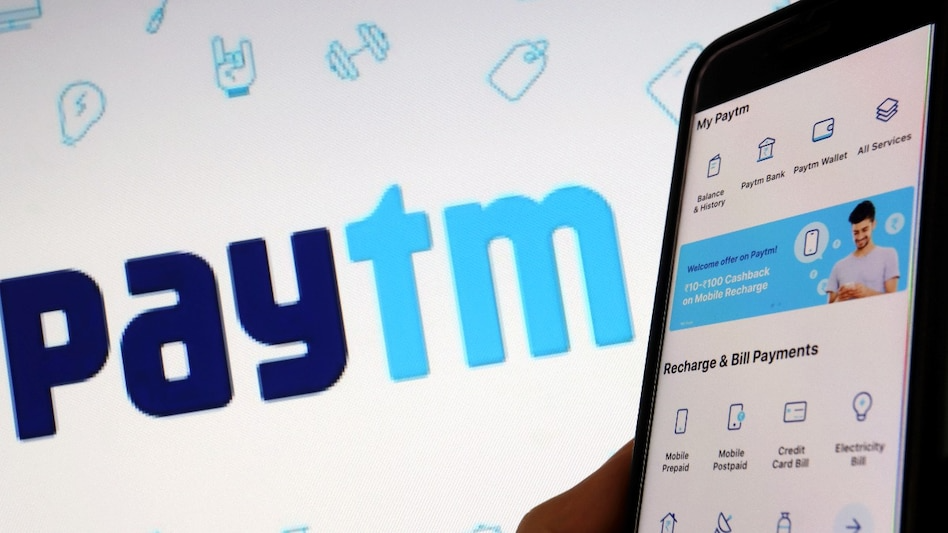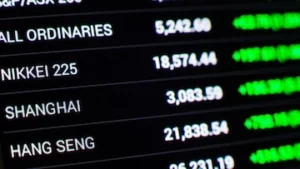Paytm shares in news after clarification on ED investigation report; price band for stock revised to 10%

Paytm share price today: Stock exchanges have cut the price band for the stock to 10 per cent from 20 per cent, following the 36 per cent rout on the counter in the last two sessions.
Shares of One 97 Communications (Paytm) will be in focus on Monday morning after the fintech major denied reports suggesting Enforcement Directorate (ED) was investigating the company and its founder and CEO in the money laundering case. Besides, a Bloomberg report suggested that the RBI was considering scrapping the license of Paytm Payments Bank as early as next month. Reports suggesting trader body CAIT advised traders to migrate from Paytm for other payment options would also keep the stock in news.
Stock exchanges have cut the price band for the stock to 10 per cent from 20 per cent, following the 36 per cent rout on the counter in the last two days.
“We would like to set the record straight and deny any involvement in anti-money laundering activities. We have and continue to abide by Indian laws and take regulatory orders with utmost seriousness,” Paytm said.
In a filing to stock exchanges, Paytm said neither the fintech player nor its founder and CEO are being investigated by the Enforcement Directorate regarding inter alia money laundering. In the past, Paytm said, certain merchants/users on its platforms were subject to enquiries and on those occasions, it cooperated with the authorities.
“During any such investigations by the authorities on any set of merchants/users in the past, we have cooperated with them on these investigations. This has been previously disclosed to the stock exchanges,” it said.
Paytm said there were media articles and stories on social media, which were spreading speculation
and misinformation on the reasons for RBI action on Paytm Payments Bank.
“The recent direction from RBI is a part of the ongoing supervisory engagement and compliance process. For this action, we refer our stakeholders to the official press release of RBI dated January 31, 2024 and not rely on unofficial sources. We are exploring all options to ensure that our stakeholders are protected from unwarranted and speculative stories,” it said.
Paytm’s Legal Troubles:
The Directorate of Enforcement (ED) has investigated Paytm since 2021 over alleged money laundering and illegal betting, said people with knowledge of the matter.
Revenue secretary Sanjay Malhotra had said on Saturday that the ED “will probe Paytm Payments Bank if any fresh charges of fund siphoning are found.”
ED and the Directorate of GST Intelligence (DGGI) above had also brought to the notice of the government concerns over Indian payment gateways being used as vehicles for trade-based money laundering (TBML), illegal betting and diversion of funds to crypto wallets.
In certain cases, this has been for investment in cryptocurrency mining. The transactions highlighted include those performed using Paytm, the sources said.
The Reserve Bank of India (RBI) ordered Paytm Payments Bank on January 31 to stop all basic payment services through various platforms and digital avenues, including the Unified Payments Interface (UPI), with effect from February 29, for not complying with regulations.
The regulator also barred it from offering banking services, such as accepting deposits and processing payments.
To be sure, the ED hasn’t booked Paytm in any of the money laundering cases. However, in the past few years, its offices have been searched, documents sought, merchant accounts frozen and executives questioned by the agency while investigating 365 fintech companies having links to Chinese nationals that sanctioned instant micro loans.
More recently, transactions performed by the accused through Paytm in the Mahadev Online Book (illegal betting) case were scrutinised.
“Both the agencies have demonstrated to the government how in many cases of national importance payment gateways were misused, which could pose a threat to the financial security,” said a senior government official. “Specifically on Paytm, many KYC-related lapses were found, which has led to freezing of lakhs of accounts and wallets as they were found to be suspicious in nature.” KYC refers to know-your-customer verification procedures.
Paytm denied on Sunday that it was under ED scrutiny over money laundering, nor was founder Vijay Shekhar Sharma, or parent One 97 Communications Ltd (OCL).
“We can confirm that neither we nor OCL’s founder-CEO have been the subject matter of investigation by the Enforcement Directorate regarding money laundering,” it said in a release. “Occasionally, some merchants on our platforms have been the subject of inquiries, and we cooperate fully with authorities in such instances. We categorically deny any involvement in money laundering activities and believe fair and responsible journalism is crucial for accurate information dissemination.”
Mahadev Book case
The ED, also probing betting app Mahadev Online Book in an alleged money launder scam exceeding Rs 5,500 crore, found that Paytm was one of the payment gateways used by the accused in that case for transacting with clients. According to the ED, the bets were accepted only through UPI to give it a “more credible image.”
“Since the sums involved are small and seem to be inconsequential in nature, payments for bets placed and rewards, if any, were performed only using the UPI payment route. The Indian contacts were assigned the task of creating fake UPI accounts through fake KYCs or luring the account holders a commission,” a senior official told ET. “The probe found that over eight lakh such fake accounts using fake KYC were used by the panel operators.”
Detailing one such transaction, the ED had said the main accused Sourabh Chandakar and Ravi Uppal had control over all the merchant accounts floated by the panel operators who lured the clients to bet.
“Accused Honey Singh, a panel operator… had given his Paytm account to Chandrakar for the deposit/withdrawals related to the betting,” according to the chargesheet. “Whenever a player won, Chandrakar used to transfer money in this bank account through Subham Soni (another accused) and when the player lost, the amount deposited in his Paytm account was transferred to the bank account provided by Subham Soni. This account was used by Mr Sourabh Chandrakar till August, 2021.”
Chinese loan app case
The ED’s probe into the 365 fintech companies that sanctioned instant micro loans found that the lending and recovery payment transactions were routed through payment gateways. In February 2021, the ED had summoned executives of multiple payment gateways including Paytm CFO Vikas Garg to join its probe.
In September 2022, the ED conducted searches at half a dozen premises belonging to online payment gateways such as Razorpay, Paytm and Cashfree.
“In multiple cases, the Paytm app was used as a payment instrument to make those repayments and credit transactions,” said a person close to the company. “But Paytm was not the only payment player which got involved then. There were other payment gateways and applications involved.”
Some fintech startups providing online payment services onboarded merchants with minimal KYC in their quest for quick growth, said a top executive at a digital payments firm that competes with Paytm. Merchants who might not have all their incorporation documents or might be dabbling in betting or some fraudulent activities often used these gateways, since banks would never onboard them, he added.
After the RBI issued payment aggregator guidelines in 2020 and started licensing the players from late last year, most of the large ones began closing loopholes in their systems.
“The time the regulator took to give final licences to the payment aggregators was spent mostly to get their internal systems in order and ensure sufficient checks and blocks,” said a senior tech lawyer who works with these companies.
In September 2022, in its probe into HPZ Token, the ED conducted searches at 22 locations, including 16 at premises linked to payment gateways and bank branches including Paytm.
HPZ Token lured users to invest in the company on the pretext of doubling their investment. The payments were received through UPI and other payment gateways and accounts, the ED said. Part of the amount was paid back to investors, but the remainder was diverted to various individual and company accounts through payment gateways and banks and then siphoned off by conversion to virtual currencies, the ED had said in a press statement at the time. “After that, the fraudsters stopped the payments, and the website became inaccessible,” it had said.
According to the ED, balances were maintained in the bank and virtual accounts of the entities involved with payment aggregators. These included Rs 33.36 crore with the payment gateway of Easebuzz, Rs 8.21 crore with Razorpay Software, Rs 1.28 crore with Cashfree Payments and Rs 1.11 crore with Paytm Payments.
With Thanks Reference to: https://www.businesstoday.in/markets/company-stock/story/paytm-shares-in-news-after-clarification-on-ed-investigation-report-price-band-for-stock-revised-to-10-416145-2024-02-05 and https://economictimes.indiatimes.com/tech/technology/ed-dggi-flag-concerns-about-payment-gateways-role-in-illegal-betting-money-laundering/articleshow/107407226.cms






